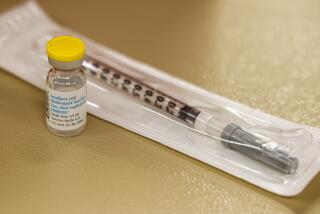Don’t Bar Doctors With HIV, NIH Says : Health: Federal researchers join AIDS activists and others who oppose restrictions. The chance of infecting a patient is seen as remote.
- Share via
WASHINGTON — Federal AIDS researchers will oppose placing restrictions on AIDS-infected health care professionals who perform surgery or other invasive procedures, lining up with AIDS activists and numerous medical and public health groups, knowledgeable sources say.
Officials of the National Institutes of Health--the leading government AIDS research agency--have told the Centers for Disease Control that they see no scientific basis for limiting the work of such people, since the risk of their transmitting the AIDS virus is remote, the sources say.
This point of view was outlined in a recent memo to the CDC from Dr. Bernadine P. Healy, the NIH director.
NIH officials also have said they are concerned that imposing restrictions on some health professionals could contribute to the creation of two classes of patient care--one for the uninfected and another for those who are infected--since some health workers might then refuse to care for infected patients, sources said.
Scientists at the NIH, particularly in the National Institute of Allergy and Infectious Diseases and in the National Cancer Institute, are involved in numerous aspects of AIDS research. They study the Human Immunodeficiency Virus, which causes AIDS, and the impact of experimental drugs and vaccines for AIDS and AIDS-related conditions. Also, the NIH directs a large-scale program of AIDS clinical trials that involves researchers at universities and other institutions across the nation.
The CDC has been debating guidelines for HIV-infected health care workers involved in surgery and other highly invasive procedures since it was revealed last summer that a Florida dentist with AIDS apparently had infected several of his patients.
Dr. James O. Mason, assistant secretary for health, has told officials on both sides of the issue to “sit down and work out a compromise” on the proposed guidelines. He wants all segments of the Public Health Service to agree before recommendations are released, the sources said.
“I think it’s particularly important that the agency with the most experience working with this virus and treating patients feels that there is no basis for restrictions,” said Jeff Levi, director of government affairs for the AIDS Action Council, which opposes any restrictions.
Other groups opposed to restrictions include the American Hospital Assn., which represents more than 5,000 public and private hospitals across the country, the American Public Health Assn., the American College of Emergency Physicians, the American Academy of Pediatrics and the American College of Physicians.
As drafted, the guidelines stress that doctors and dentists who perform “seriously invasive” procedures have a professional responsibility to know whether they are infected and to take appropriate actions to protect their patients, including refraining from performing such procedures. The guidelines recommend that infected health care workers seek counsel from an expert review panel, including the physician’s own personal physician, state or local public health officials, an infectious disease specialist and professionals experienced in the procedures performed by the health care worker.
In the draft, the CDC defines “seriously” invasive procedures as those in which a sharp instrument is used inside a “highly confined” anatomical site or where visibility is poor. The draft guidelines recommend that medical institutions and medical societies determine which specific procedures fit into these categories.
Sources said that there is disagreement among CDC officials over some important details of the recommendation, such as when an infected professional should seek help from the panel or refrain from practice.
The guidelines also would apply to transmission of the hepatitis B virus, which causes a potentially life-threatening liver disease.
The Florida case is the only known instance of HIV being transmitted from a health care professional to a patient, although there are several dozen documented cases of health care workers who have been infected by patients, mostly via so-called “needle-stick” injuries.
The issue has prompted the American Medical Assn. and the American Dental Assn. to call on their members to refrain voluntarily from performing surgery if they are infected.
More to Read
Sign up for Essential California
The most important California stories and recommendations in your inbox every morning.
You may occasionally receive promotional content from the Los Angeles Times.













